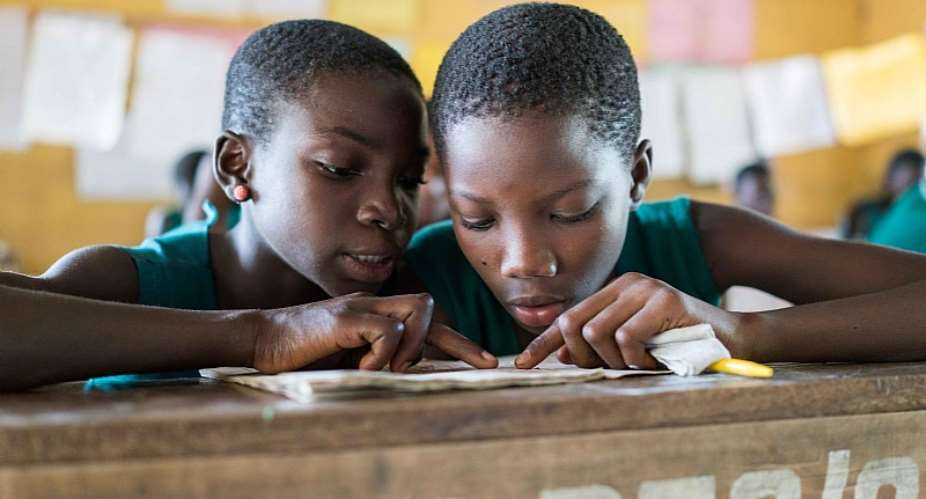English Language is not the measure of one's intelligence or imbecility. But it is first in importance among the competencies and skills Ghanaian basic school pupils must acquire. With the apparent exception of the Ghanaian languages taught in the classroom, all other subjects are clothed in English, as per the GES rule, from upper primary to PhD level. Therefore, it is important to equip pupils with all the necessary assistance to elevate their competency in the language right from scratch.
Speaking is a skill. Speaking of English language is no exception. But just like any other skills, constant practice makes pupils perfect in English. Pupils who can read, interpret and understand a text in English has the propensity to do extremely well in all other reading subjects.
However, Ghanaian Basic Schools have the most and shameful reputation for being the last and the least with English speaking culture on campuses despite having the professionally trained English teaching staff to assist pupils.
Such a culture, as shameful as it is, has been blamed on a host of factors. Large basic school population, poor teacher effort, lack of reading materials except textbooks and bla bla bla just to name a few of the alleged variables.
I take a different view, however. I argue that the situation is unsurprising, inadvertent but correctly decided and consistent with the geographical placement of teachers across the state. I do not address the issue of teacher postings but leave that to other writers and future posts. I would also like to raise only observation about the canker, as well as a solution.
Also, it is not the place of this short post to address all the scholastic arguing.
Rather, here I put forth my view.
First, the lack of regular English speakers in our public schools is unsurprising but consistent with, as I have said, the distribution of teachers in the nation. As I have observed, as well as from other sources, teachers who are posted to work in their tribal zones often fail to inculcate English speaking habits in their pupils. This observation is confirmed by the understanding that, when pupils and teachers have a common native tongue, there is little or no effort for communicating in the L2.
It is fair to say, however, that, when people who share a common indigenous language meet, few thinking people would choose a different alternative medium to communicate. Thus, in my view, the spread of vernaculars in our public basic schools and SHS has to be seen as the byproduct of the teacher placement method and correspondingly calls for efforts to change the way the system functions.
I argue that, it would score a goal if teachers are placed outside the spheres of their ethnic communities. To set, for the purpose of illustration, an example, teachers of Akan parentage ought to be placed in a non Akan speaking community. A teacher of Ewe nativity, equally ought not be posted in a community that speaks Ewe. Finding themselves in foreign localities as in the example above should make teachers have interactions with their pupils only in the prescribed language of the Ghanaian academia. Had GES done so, it would have sent teachers to communities whose languages they do not speak and understand. Certainly, English would be the only common bridge of communication between teachers and pupils in teaching, learning and all other situations.
Certainly, GES may wish to change the rule. For GES to do so, it would have to have the background information of teachers. It needs to do so explicitly, by taking the difficult decision to amend the policy it use on the posting of teachers.
Unless this is done, in my view, the scholarly objective of preparing children to take up tasks in a world where English employs, pays and fires cannot properly be achieved.
written by a Ghana Writers' Award winning author Paa Kwesi Arko Cee





 SSNIT must be managed without gov’t interference – Austin Gamey
SSNIT must be managed without gov’t interference – Austin Gamey
 Ejisu by-election could go either way between NPP and independent candidate — Gl...
Ejisu by-election could go either way between NPP and independent candidate — Gl...
 We never asked ministers, DCEs to bring NPP apparatchiks for returning officer r...
We never asked ministers, DCEs to bring NPP apparatchiks for returning officer r...
 No one denigrated the commission when you appointed NDC sympathizers during your...
No one denigrated the commission when you appointed NDC sympathizers during your...
 Used cloth dealers protests over delayed Kumasi Central Market project
Used cloth dealers protests over delayed Kumasi Central Market project
 A/R: Kwadaso onion market traders refuse to relocate to new site
A/R: Kwadaso onion market traders refuse to relocate to new site
 Dumsor: Corn mill operators at Kaneshie market face financial crisis
Dumsor: Corn mill operators at Kaneshie market face financial crisis
 Jamestown fishermen seek support over destruction of canoes by Tuesday's heavy d...
Jamestown fishermen seek support over destruction of canoes by Tuesday's heavy d...
 Election 2024: EC to commence voter registration exercise on May 7
Election 2024: EC to commence voter registration exercise on May 7
 Western Region: GWL hopeful of restoration of water today in Sekondi-Takoradi
Western Region: GWL hopeful of restoration of water today in Sekondi-Takoradi
